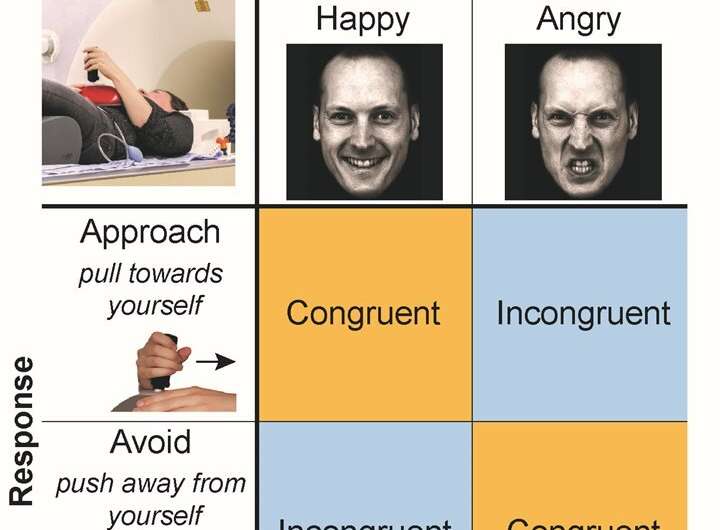Testosterone affects emotion regulation system in brains of aggressive police recruits

Brain research shows that police recruits who have relatively high trait aggression exhibit increased control over their emotion regulation system. However, testosterone appears to affect this control: at high testosterone levels, aggressive recruits appear to have less control over emotion regulation. Scientists from Radboud University publish these findings in Psychological Science.
Regulating emotions is crucial for everyday behaviour. To regulate emotions, the frontal cortex controls clusters of nuclei in the brain known as the amygdala. Emergency responders such as police officers must be able to regulate their emotions in extreme circumstances and are therefore selected for strong emotional control. Nevertheless, some police officers display excessively aggressive behaviour during challenging situations. In these situations, the body produces more testosterone, which is known to affect behaviour. Until now, however, the relationship between aggression, testosterone and emotional control in otherwise well-functioning people was unknown.
Attraction to happy faces, avoidance of angry faces
The researchers requested 275 police recruits to perform a task while inside an MRI scanner. They measured the reaction time of the automatic tendency to pull a joystick when viewing images of 'happy' faces or to push the joystick when viewing 'angry' faces.
During this experiment, the researchers observed more activation in the frontal cortex and less activation in the amygdala in a subgroup group of police recruits who had aggressive characteristics. This occurred when they were asked to control their reflex by making the inverse movement with the joystick (pull it towards them when they saw angry faces and push it away when they saw happy faces). "Such counter-intuitive joystick movements require good emotional control, and recruits with high trait aggression seemed to suppress their automatic tendencies through increased brain activity," explains Reinoud Kaldewaij, neuroscientist at the Donders Institute of Radboud University. However, the researchers found no corresponding effect on behaviour. Kaldewaij: "The recruits in the aggressive subgroup responded just as quickly and made just as many mistakes as those from the less aggressive subgroup."
Testosterone affects emotional control
The researchers then examined the influence of testosterone on this emotional control by measuring the testosterone level in the saliva of the recruits. This showed that testosterone diminishes emotional control in recruits from the aggressive subgroup. Kaldewaij: "Recruits with high testosterone levels and high trait aggression showed less communication between the frontal cortex and the amygdala during emotion regulation."
Compensation for aggression and testosterone
The results show that people who are aggressive, but otherwise healthy and well-functioning, can compensate for their emotional reactions through increased brain activity. Kaldewaij: "Having aggressive characteristics does not have to lead to aggressive behaviour because the brain can compensate for this aggression. But this system fails when testosterone levels are high." That could explain why some police officers may have difficulty controlling their behaviour during extreme circumstances. "This could have consequences for selection procedures and training programmes for emergency responders. But before that is implemented, we must first show that testosterone directly causes behavioural changes in police recruits with aggressive characteristics," Professor of Clinical Psychology Karin Roelofs adds.
More information: Reinoud Kaldewaij et al. High Endogenous Testosterone Levels Are Associated With Diminished Neural Emotional Control in Aggressive Police Recruits, Psychological Science (2019). DOI: 10.1177/0956797619851753



















